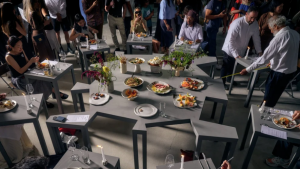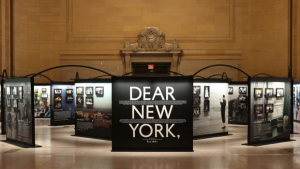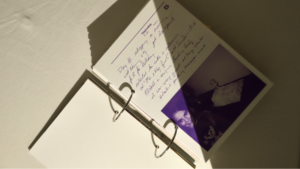
A quick perusal of traditional stock image galleries is all it takes to uncover the problem. Images featuring white faces are abundant. Heteronormative couples dominate depictions of romantic love. Eurocentric beauty features rule, and the presence of diverse body types is virtually non-existent.
Sure – black, brown and non-binary bodies are there, but they’re largely sidelined. Founded by photographer Joshua Kissi and his partner Karen Okonkwo, TONL aims to confront this standard.
A reimagining of the standard practice of stock photography, TONL brazenly disrupts the homogeneous nature of the style through its introduction of imagery that makes people of colour its focus. Though Okonkwo presented the idea to Kissi more than a year before it really began to take shape, he was hesitant. It would take another incident of police brutality to galvanise the photographer into channeling his creativity toward the project’s uncompromising social agenda.

“After the murders of Philando Castile and Alton Sterling by the police in the United States, I just felt helpless,” Kissi says. “Moments like that, seeing somebody being murdered on TV or on the internet, you feel helpless. I sat down and thought, ‘How can I help build a narrative that combats these types of systems of white supremacy, racism and systematic oppression? Can my gift for imagery help combat that?’”
The son of immigrant parents, Kissi was born and raised in New York City’s Bronx neighbourhood. Though over 5000 miles away from his folks’ home country of Ghana, he had little difficulty finding pieces of his heritage to connect with, as an influx of West Africans to the vibrant, uptown borough in the 1950’s turned it into a mini-Accra.
“The Bronx has the highest population of Ghanaian people outside of Ghana,” Kissi says. “When people leave Africa and migrate to a place like New York City, or any other big cities, we tend to create an enclave of what was familiar to us back home right there – and that has certainly had a big influence on my perspective today.”

Immensely proud of his African heritage, Kissi is happy to embrace the dual perspectives he feels being a first generation Ghanaian-American has imbued him with. With no formal training as a photographer, he has long relied on open communication and relationships to get the right shot as well as what he declares the most important piece of equipment: his eye.
“The way you move around the world, the relationships you have, the different conversations you have – these are all moments when you’re capturing information from people but at the same time taking it in,” he says.
“Capturing somebody from behind the lens is like almost capturing a sense of who they are in their soul. And in order to do that, they have to let you in.”
Coming of age in the time of the internet, Kissi spent a lot of time as a teenager browsing the net’s early style and fashion forums. Street photography was gaining momentum online, and, through trial and error, an eighteen-year-old Kissi began experimenting with the medium – eventually founding style blog, Street Etiquette, with his friend, Travis Gumbs, which has since evolved into a full-time, creative agency.

“I think Street Etiquette opened up perspectives for many people who wanted to try different styles, express themselves in a different way, and open up their identity,” Kissi says of the platform. “It made black men feel like there wasn’t just one way to be black men; it granted a sense of community and identity in a space where there weren’t a lot of expressions on how black men should look, feel or act.”
With TONL, Kissi is hoping that he and Okonkwo’s creation of a more diverse image bank will not only help change external perceptions of minorities, but will also alter these individuals’ own perceptions of themselves.
This is already starting to happen if young photographers like Myles Loftin, who participated in the inagural antenna, are anything to go by. In his talk during Dutch Design Week last year, he mentioned working with Kissi and Okonkwo as one of his ambitions because of the work they are doing in trying to diversify stock photography.
Cognisant of just how important representation is, Kissi says he is desperate to craft a new narrative that helps diminish the stereotypes that plague people of colour around the world.
“There’s always been this big fight for representation,” Kissi acknowledges. “Stock photos are what you see in commercials and on billboards, you see it in advertising, and all over the internet. This is what shapes our realties and our perceptions of our world. So, if you are able to alter these images to be more representative of how the world actually looks, that’s when you begin to change the narrative and change history.”

Though it is absolutely a for-profit company with a product to sell, Kissi speaks animatedly of the enthusiastic response TONL has garnered from fans who don’t even utilise stock photography. Emails flood in every day, he says, from followers who love and admire the idea, affirming Kissi’s notion that to see oneself represented as part of a bigger picture holds irrefutable power.
“We really are trying to demolish the idea of stock photography as just stock – it’s all about people’s stories,” he says. “And to be able to convince people that this idea of representation and inclusion and everybody having a seat at the table is important, that’s huge.”
You can keep up with Kissi's work by following him on Instagram.
More photographers on representation:
Hafeez Floris captures the other side of South Africa's townships
Myles Loftin explores the racial profiling of black men wearing hoodies
Cole Ndelu's arresting work tackles collective memory and the portrayal of black bodies
Myles Loftin on the importance of representing black masculinity dfferently






